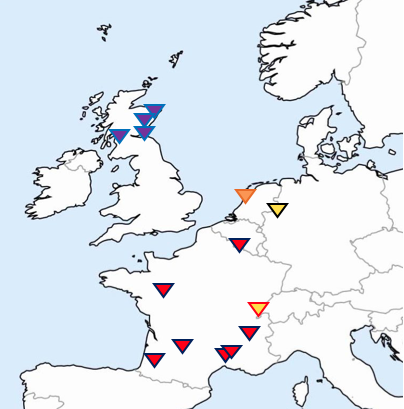Subproject D: A geography of Reformed scholasticism: from Geneva to Scotland and France
The sub-project ‘D’ in A Disregarded Past project investigates Reformed scholasticism in Scotland and France, especially the role of Scotism in the formulation of Reformed orthodoxy. Geneva was pivotal in the origin of the Scottish Reformation (1560): the leading Scottish reformer, John Knox, lived and studied in Geneva under the watchful eye of John Calvin. In Scotland, the universities were aligned to the Reformed faith. After the Edict of Nantes (1585), Protestant Academies were founded in France, and the Scots were integral to their intellectual life. For example, the philosopher Marc Duncan (1581-1640) and the theologian James Cameron (1579-1625) are inextricably associated with the Protestant Academy of Saumur. The theologian and university reformer Andrew Melville (1545-1622) spent his formative years in the academies of France and Switzerland. The Reformation spreading from Geneva thus gave new life to the long-established Scottish presence in France, which dates back to the Paris and Glasgow theologian John Mair (1467-1550) and, of course, the Oxford and Paris theologian and philosopher John Duns Scotus (1265/66-1308). Sub-project D investigates the common intellectual and geographical space between Geneva, Scotland and France: a “geography” of Reformed scholasticism.
The theology and philosophy of John Duns Scotus is an important part of this narrative. Alexander Broadie has argued for the importance of Scotism in Mair, and for a looming ‘shadow of Scotus’ on later Scottish philosophy. The important A Companion to the Theology of John Mair (2015), discusses the legacy of Scotus. Also important is the question of Scotism in the early Genevan reformers. Scotism has been acknowledged as important for Reformed scholasticism in the Scottish universities, especially from the perspective of the early reception of Cartesianism (Gellera 2013, 2015, 2017). Hence the question about the French Protestant Academies, ‘poussées vers le cartésianisme’ (Pittion 1996), most famously with the Saumur and Geneva philosopher Jean-Robert Chouet (1642-1731): what was the role of Scotism? The hypothesis is that a so far unacknowledged Scotistic legacy exerted a continuous influence on the formulation of Reformed scholasticism across Scotland and France between Mair and Chouet.
The sources involved are primarily academic, from both theology and philosophy faculties. The most obvious are graduation theses, lecture notes, dictates, and inaugural lectures. The following list is provisional and includes only Scots, but gives a good idea of the spectrum of thinkers investigated: Robert Rollock (c.1555-99): theologian and university professor in Edinburgh; Andrew Melville (1545-1622): theologian, university professor and reformer in Glasgow, St Andrews and France; John Knox: (1513-72): reformer, preacher, theologian in Geneva and Edinburgh; John Mair (1467-1550): theologian, philosopher and university rector in Paris and Glasgow; Marc Duncan (1581-1640): medical doctor, philosophy professor, logician in Saumur; John Cameron (c.1579-1625): theology professor in Glasgow and Saumur; Florence Wilson (c.1504-n.d.): humanist in Lyon; William Chalmers (1596-1678): Catholic priest, theologian in Rome and France.

A Geography of Reformed Scholasticism
